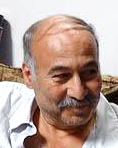
Nakoula Basseley Nakoula
By Staff
THE ASSOCIATED PRESS
LOS ANGELES (AP) — A filmmaker linked to an anti-Islamic movie inflaming protests across the Middle East said following an interview with law enforcement officials that he would not return to his home, possibly heading into hiding, authorities said.
Nakoula Basseley Nakoula, 55, was interviewed by federal probation officers for about half an hour at the station shortly after 12 a.m. in his hometown of Cerritos, Calif., said Steve Whitmore, spokesman for the Los Angeles County sheriff’s department.
After that, deputies dropped Nakoula off at an undisclosed location.
“He is gone. We don’t know where he went,” Whitmore said. “He said he is not going back to his home.”
Federal officials are investigating whether Nakoula, who has been convicted of financial crimes, has violated the terms of his five-year probation. If so, a judge could send him back to prison.
Nakoula went voluntarily to the station, wearing a coat, hat, scarf, and glasses that concealed his appearance. His home has been besieged by media for several days.
Whitmore said Nakoula was not handcuffed and the heavy apparel was his idea.
The probation department is reviewing the case of Nakoula, who pleaded no contest to bank fraud charges in 2010 and was banned from using computers or the Internet or using false identities as part of his sentence. Whitmore did not disclose other details about the interview.
Federal authorities have identified Nakoula, a self-described Coptic Christian, as the key figure behind “Innocence of Muslims,” a film denigrating Islam and the Prophet Muhammad that ignited mob violence against U.S. embassies across the Middle East.
Much of the film was shot inside the offices of Media for Christ, a nonprofit based in the Los Angeles-area city of Duarte. The charity raised more than $1 million last year “to glow Jesus’ light” to the world.
The Riverside County man, who was a script adviser to the film and who has a long history of anti-Islamic activism, told the Press-Enterprise newspaper that he has received multiple death threats.
“I’m really tired,” Steven Klein said when he answered the door of his home in Hemet, Calif., on Friday, Sept. 14, with a pistol in his hand and clad only in a pair of white shorts stained with what appeared to be ink spots.
The newspaper said Klein, a Vietnam veteran, appeared agitated. While waving the gun, he told the newspaper he was standing up for his First Amendment rights in helping with the film and said he is prepared to die for those rights.
A federal law enforcement official said authorities had connected Nakoula to a man using the pseudonym of Sam Bacile, who claimed earlier to be the writer and director of the film.
Violent protests set off by the film in Libya played a role in the attacks in Benghazi that killed U.S. Ambassador Chris Stevens and three other American officials. Anti-U.S. mob protests have since spread to several other countries.
Leaders of Egyptian Coptic and Muslim communities from New Jersey and New York City and its suburbs gathered at a mosque Saturday, Sept. 15, in a show of unity. The group, meeting in Jersey City, N.J., expressed pain over the wave of protests and appealed for calm.
“Those who did this (film) are not Christian,” Rev. David Bebawi, a Coptic priest, told the gathering of about 30 leaders. “Those who killed the American ambassador and others are not Muslim.”
An organizer of Saturday’s event, Egyptian-born Muslim Ahmed Shedeed, said as a community with deep roots in America, many are struggling with a range of emotions.
“There is an agony in the community, there is turmoil over this happening,” Shedeed said. “It’s something we all have to face as a united Egyptian community and make sure those looking to pull us apart do not succeed.” (end)
Associated Press writers Bob Seavey in Phoenix, Pete Yost, Stephen Braun and Ted Bridis in Washingtonb and Samantha Henry in Jersey City, N.J., contributed to this report.



